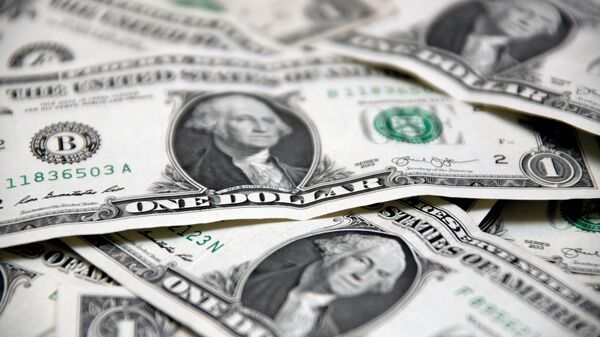MOSCOW (Sputnik) — The possible cancellation of the US national debt limit may benefit the country's economy and reduce the uncertainty and risk of default, but might simultaneously weaken the country's fiscal discipline, experts told Sputnik.
On Friday, the national debt of the United States exceeded $20 trillion for the first time ever, jumping $318 billion on one day to $20.162 trillion. On the same day, US President Donald Trump signed a bill that suspended the debt ceiling until December 8 and allowed unlimited federal borrowing, siding with Democrats on shorter debt limit over the arguments of fellow Republicans, who pressed for a 18-month cap suspension, well past the 2018 mid-term elections.
In March, the US Congressional Budget Office (CBO) said in its 2017 Long-Term Budget Outlook that the cumulative US national debt would grow to 150 percent of the nation’s annual economic output of goods and services by 2047 if present spending laws remain unchanged from the about 106 percent of GDP.
Shorter or Longer Debt Ceiling?
Ed Lorenzen, Senior Advisor for the Committee for a Responsible Federal Budget, a US non-profit organization committed to educating the public on issues with significant fiscal policy impact, told Sputnik that either a longer repeal or complete elimination of debt cap might be good to the country's economy.
"A longer suspension of the debt limit or elimination of debt limit altogether would eliminate the uncertainty and risk of default when we reach the debt limit which would be beneficial to the economy, but doing so would reduce pressure on Congress to be fiscally responsible and control the growth of the debt, which could be harmful," Lorenzen said.
He added that it was necessary to find ways to reform the debt limit to reduce the risk of default while preserving it as a tool to encourage fiscal discipline.
"Repeal of the debt ceiling is in principle a good idea; it is purely a political gesture and serves no economic function. Practically no other country has such a limit," Galbraith told Sputnik.
However, he noted that the policy consequences of a short extension are positive.
"They give the Democratic leadership in Congress a decisive role in the periodic negotiations required to extend the ceiling. And as the President has discovered, the Democrats can deliver on their promises whereas the Republican leadership cannot," Galbraith explained.
The two experts declined to make any projections for the national debt increase by December 8. Galbraith recommended to address the Congressional Budget Office for the most reliable estimates.
Is Default Possible?
The Social Security Trust Fund, the retirement fund for US citizens, owns approximately 30 percent of the US national debt, and together with all the retirement and pension funds, nearly half of it, and they may suffer in case of the possible default, Lorenzen said.
"All holders of US debt would be harmed if the US government were to default and the value of Treasury bills as a safe investment were damaged," the expert said, when asked whether US residents would take the bigger damage if default occurs.
In addition, a government default that prevents the government from meeting its obligations would harm anyone who receives payments from the government, including government contractors, federal employees, beneficiaries of government programs, state and local governments receiving federal grants and others, he warned.
"But the bigger harm will come from the damage to the economy from the impact of undermining confidence in the US dollar as the reserve currency which would ultimately harm the entire world economy," Lorenzen noted.
"The US government is barred by the 14th amendment to the Constitution from defaulting on its debt," Galbraith said.
There is no mechanical process by which default could occur, Galbraith added, explaining that software to stop payments authorized by law does not exist and cannot be created without legal authorization.
"But even a technical default would be a non-event from the standpoint of the markets: debt holders would simply accrue the interest and principal due in anticipation of an early resolution of the crisis. Further still, while the dollar is a floating currency, the degree of depreciation that might occur given the lack of a viable alternative reserve currency is relatively slight," he said.
The US government is not in the same position the Russian government found itself in 1998, when Russia plummeted into a financial crisis defaulting on its debt, and there is essentially no risk of a comparable situation developing, Galbraith noted.
"That is why we do not observe any panic on the exchange markets as these political kerfuffles come and go," he concluded.




